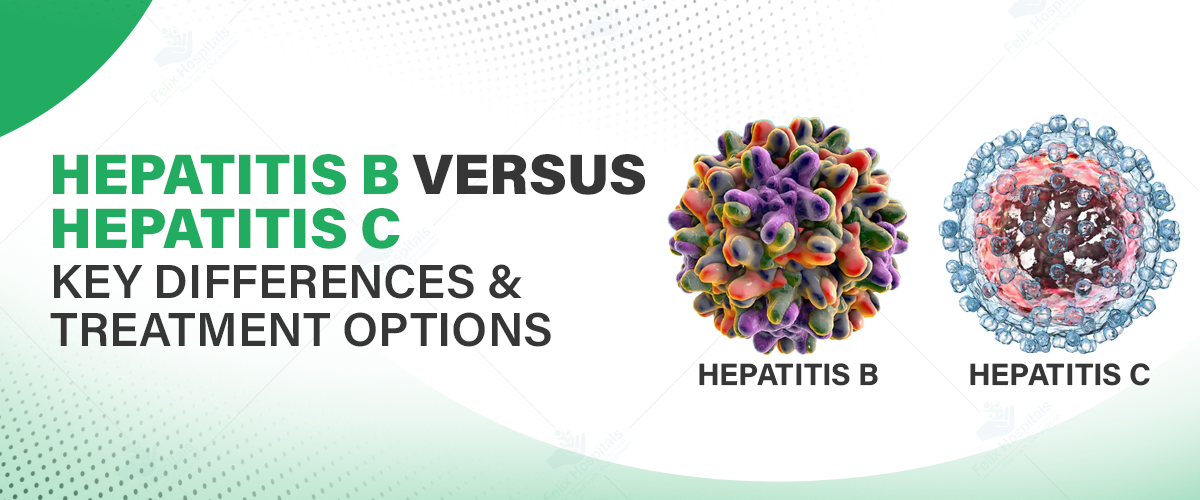
Subscribe to our

Hepatitis is a term used to describe inflammation of the liver, a vital organ responsible for numerous critical bodily functions, including detoxification, protein synthesis, and bile production. Two of the most common and serious types of viral hepatitis are Hepatitis B (HBV) and Hepatitis C (HCV). Understanding the differences between these conditions is essential for effective prevention, diagnosis, and treatment.
The liver’s health is paramount, and individuals suffering from HBV or HCV require specialized care. For patients in Noida, Felix Hospital stands out as the best gastro hospital, offering cutting-edge diagnostic and treatment services. The global burden of both HBV and HCV underscores the importance of raising awareness and implementing effective interventions to combat these diseases.
Contact us at +91 9667064100 Felix Hospital to schedule an appointment with our leading gastroenterologists for personalized diagnosis and treatment.
Hepatitis B is caused by the Hepatitis B virus, which can lead to acute or chronic liver infection. This virus is highly contagious and primarily transmitted through the following routes:
Risk Factors and Susceptible Populations:
Hepatitis C, caused by the Hepatitis C virus, is another serious liver infection. Unlike HBV, HCV is primarily transmitted through blood-to-blood contact, with common modes of transmission including:
Risk Factors and Susceptible Populations:
Hepatitis B can manifest as either an acute or chronic infection. Acute infection symptoms appear within six months of exposure and include:
Chronic HBV can remain asymptomatic for years but poses a significant risk of progressing to:
Hepatitis C is often called a “silent” disease because many individuals remain asymptomatic for years. When symptoms do appear, they may include:
Chronic HCV significantly increases the risk of:
HBV: Transmitted through multiple routes, including blood, sexual contact, and from mother to child.
HCV: Primarily spread through blood-to-blood contact.
HBV: May be acute or chronic, depending on the immune response.
HCV: High likelihood of chronic infection if left untreated.
Accurate diagnosis of HBV and HCV is crucial for effective treatment. Diagnostic methods include:
Blood Tests:
-HBV: Testing for Hepatitis B surface antigen (HBsAg).
-HCV: Detecting HCV RNA through polymerase chain reaction (PCR).
Liver Function Tests: To assess liver damage.
1) Imaging: Ultrasound or elastography to evaluate liver stiffness.
2) Liver Biopsy: In some cases, to determine the extent of liver damage.
Hepatitis B Prevention
Hepatitis C Prevention
Safe Practices:
-Use sterile needles for injections.
-Avoid sharing personal items like razors or toothbrushes.
-Ensure safety in medical and cosmetic procedures.
For those seeking world-class care, Felix Hospital offers comprehensive treatment for hepatitis and other liver conditions. Our team includes some of the best gastroenterologists for hepatitis treatment:
With state-of-the-art facilities and a patient-centered approach, Felix Hospital ensures optimal outcomes for every patient.
Don't let Hepatitis B or C affect your health, Book a consultation at Felix Hospital for early screening and prevention strategies.
Hepatitis B and Hepatitis C are serious liver conditions that require timely diagnosis and appropriate management. While both share some similarities, their differences in transmission, vaccine availability, and treatment options highlight the need for tailored approaches. Advances in antiviral therapies and DAAs have significantly improved the prognosis for patients.
Preventive measures, including vaccination for HBV and harm reduction strategies for HCV, are critical in reducing the global burden of these diseases. Regular screening and expert care, such as that provided by Felix Hospital’s exceptional team of gastroenterologists, are essential for managing and combating these conditions. Together, we can work towards a healthier future by prioritizing liver health and raising awareness about hepatitis.
1. What is the difference in treatment response between Hepatitis B and Hepatitis C?
Ans: Hepatitis B requires long-term management with antiviral medications to suppress viral replication, while Hepatitis C can be cured in most cases with direct-acting antivirals (DAAs). The treatment success rates for HCV are over 90%, offering a clear path to a cure.
2. Can Hepatitis B or C be transmitted through casual contact, such as hugging or sharing meals?
Ans: No, both Hepatitis B and C are not transmitted through casual contact. They are primarily spread through blood-to-blood contact (HCV) and various routes such as blood, sexual contact, or from mother to child (HBV).
3. What are the long-term risks associated with untreated Hepatitis B and Hepatitis C?
Ans: If left untreated, both Hepatitis B and C can lead to serious complications such as cirrhosis, liver cancer, and liver failure, with Hepatitis C having a higher likelihood of progressing to chronic liver disease.
4. Why is a vaccine available for Hepatitis B but not for Hepatitis C?
Ans: Hepatitis B has a stable and effective vaccine because the virus has a clear target for immune response, whereas Hepatitis C has multiple strains with diverse genetic variations, making vaccine development more challenging.
5. How effective are current Hepatitis C treatments at Felix Hospital?
Ans: At Felix Hospital, we use cutting-edge direct-acting antivirals (DAAs) that offer over 90% cure rates for Hepatitis C. Our personalized treatment plans ensure the best possible outcomes for each patient.
6. Is liver biopsy always necessary to diagnose Hepatitis B or C?
Ans: No, a liver biopsy is not always required. Blood tests and imaging, such as ultrasound or elastography, are typically sufficient to diagnose and assess liver damage in most cases of Hepatitis B or C.
7. Can I get Hepatitis C from a tattoo or piercing done with unsterilized equipment?
Ans: Yes, Hepatitis C can be transmitted through sharing needles or using unsterilized equipment for tattoos and piercings, making it essential to ensure that all equipment is properly sterilized before use.